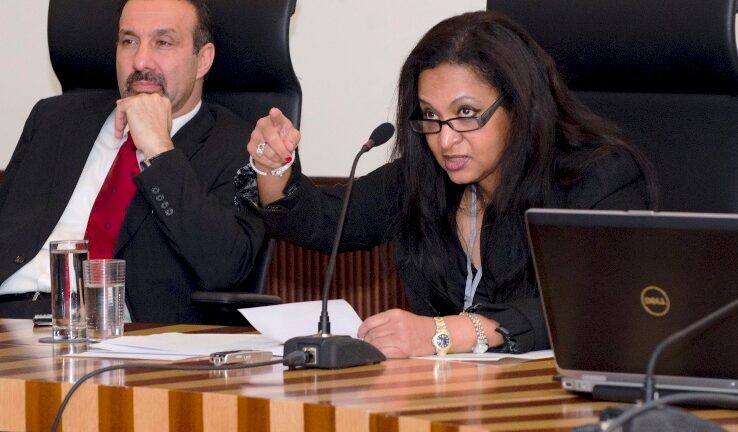CIRS Faculty Lectures, Regional Studies
Rogaia Abusharaf on 'Debating Darfur'

Rogaia Abusharaf, Associate Professor of Anthropology at Georgetown University School of Foreign Service in Qatar and CIRS Faculty Fellow 2012-2013, led a Focused Discussion on “Debating Darfur in the World” on April 24, 2013. The lecture focused on the narratives that have been used by the Sudanese government, Western media, and diaspora communities to make sense of the Darfur crisis. Reporting on the extent of violence, Abusharaf recounted that “during the seven years of strife in Darfur, more than 2.7 million persons have been forcibly displaced. Human rights organizations estimate the death toll at 400,000,” although, she said, this figure is significantly higher if we take into account those who died as a result of displacement and other circumstances related to the conflict.
The Darfur crisis has become a linchpin for various interest groups, including Western public figures and media outlets, as a cause célèbre often to further ulterior political and ideological goals. In this context, the narrative used to describe the crisis often echoes that of the WWII Holocaust as it is rooted in notions of ethnicity and ethnic cleansing. “Yet,” Abusharaf argued, “the deployment of the Arab versus African formulation as the sole explanatory model divorced from other sociopolitical forces shaping society in Darfur is a serious distortion,” as these are unstable ethnic categories that do not neatly subscribe to Darfurian power and identity structures. Darfur has a long history of intermarriage and reciprocity between the hybrid ethnic groups, and so this strict categorization of Arab versus African cannot be sustained except through the epistemic violence of reductionist and ideologically-loaded political narratives. She continued by noting that “ethnicity, when politically mobilized and manipulated, camouflages other fundamental dimensions of the conflict, such as banditry, land-tenure systems, environmental degradation, arms proliferation and militarization, border politics, and systemic marginality.” In the past, “alterity did not prompt massacres;” in the current climate, however, it is used as justification for violence, either deliberately or inadvertently by irresponsible actors.
As judgment for the atrocities taking place in Darfur, President Omar Hassan Al-Bashir was issued with an arrest warrant by the International Criminal Court. The warrant elicited both pro and anti Al-Bashir sentiments, locally and within the Sudanese diaspora abroad. The responses of these groups differ markedly from each other as the groups align themselves with different strategic interests. Citing her ethnographic research conducted at Darfur-related conferences, rallies, and meetings, Abusharaf explained how political and cultural identities produce radically different discourses on Darfur. In the United States, for example, questions of race and gender are at the forefront of framing the Darfur crisis, whereas the diasporic discourses annunciated in Doha are more aligned with narratives of reconciliation and social cohesion.
Darfur has thus become the site upon which notions of anti-imperialism and victimization are simultaneously enacted by pro and anti Al-Bashir camps, respectively. These narratives have been broadcast in the international media as public theatrical performances where Darfur is simultaneously portrayed as resistance to neocolonial international forces as well as to domestic ethnic marginalization.
As a final thought, Abusharaf commented that there are current concerted efforts taking place in Doha to address the Darfur crisis. This is a loose organization of interested people that do not classify themselves according to strict ethnic divisions, but along the lines of an active civil society. “In the midst of passions, pity, propaganda, and polarization, debating Darfur requires a special objectivity and distance from approaches that enlarge rifts and fragmentation that keep the tragedy going,” she concluded.
Rogaia M. Abusharaf is the CIRS SFS-Q Faculty Fellow, and an Associate Professor of Anthropology at Georgetown University’s School of Foreign Service in Qatar. She is the author of Transforming Displaced Women in Sudan: Politics and the Body in a Squatter Settlement (University of Chicago Press 2009); Female Circumcision: Multicultural Perspectives(Ed.). (University of Pennsylvania Press 2006) and Wanderings (Cornell University Press 2002). She is the editor of a 2010 special issue of South Atlantic Quarterly (Duke University Press). She was a recipient of Postdoctoral and Senior fellowships at Durham University in the U.K. and at Brown and Harvard Universities. Her work was supported by Guggenheim Foundation, the Royal Anthropological Institute, the Sir William Luce Memorial Fellowship, Andrew Mellon and MIT Center for International Studies and Rockefeller Bellagio Study Center, Qatar University College of Arts and Sciences.
Article by Suzi Mirgani, Manager and Editor for CIRS Publications.